Celebrate the Catalog : Scott Walker

As legends go, there aren’t many as enigmatic or puzzling as Scott Walker. American born, but based for much of his career in the UK, Scott Engel made a name for himself as a member of pop trio the Walker Brothers, none of whom were actually named Walker or blood related. As Engel—Walker chosen as his stage name—matured as an artist, he began to take on challenging, complex material early and often. Four of his first five albums, all of which bear the name Scott in some variation, reveal a performer whose sophistication and boldness well surpassed his twenty-something years.
But things got weird for a while. And not in a good way. Walker, once a hugely popular performer and consistently charting artist in the UK, started to wane in popularity. And rather than use that as an opportunity to try something new, Walker retreated into standards and showtunes, his output at the time growing M.O.R. and conservative. By the mid-’70s, the Walker Brothers resumed operation, released the auspicious Nite Flights in 1978, and signaled a major change for Walker as an artist. He walked away from the standards and never looked back, his musical journey instead taking him through hellish climes, treacherous soundscapes, punishing industrial noise and stomach-churning horror. Needless to say, he really outdid himself.
Throughout all of the twists and turns of his career, the one thing that remained constant was Walker’s voice. Both at 25 and at 70, Walker has had a particular knack for commanding a song through his vocals. His voice is a versatile instrument, at times laid-back and cool, at others yearning and emotional, and more recently sinisterly satirical or ghostly and chilling. At 70, Walker has amassed an impressive if not massive body of work. He’s not the most prolific artist, but he’s definitely one that makes his output count… save for one fairly unimpressive decade. With a new box set of classic albums out, the time seemed right to reassess his catalog. Take a trip through the catalog with our Scott Walker albums guide.
30 Century Man
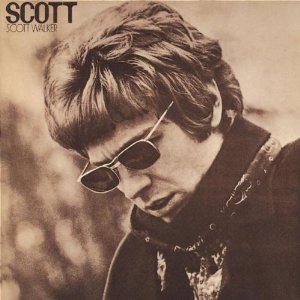 Scott
Scott
(1967; Philips)
A leap like the one that Scott Walker made from his status as pop hitmaker in the Walker Brothers to a much more complex, avant garde performer isn’t the only one of his kind. Yet, for Walker—an American recording in Britain—it might mark the most dramatic transformation an artist has ever undergone, and one that continues to shift and evolve in the present day. Released six months after the Walker Brothers’ third album, his debut, simply titled Scott, showed a vastly different and more sophisticated side of the artist. Whereas with The Walker Brothers, Walker took part in a more straightforward pop/beat music sound, on Scott, he aimed for a lush and orchestral sound, driven by his own deep, emotional crooning. Yet as a songwriter, Walker was still finding his footing, on this set mostly culling his material from other musicians’ catalogs. The album begins and ends with songs written by Jacques Brel, an artist that played an important role in influencing Walker and shaping his material to come. The first, “Mathilde,” is an explosive boom of timpani and brass, an orchestral arrival of fanfare and wit, while the closer, “Amsterdam,” is a spare dirge in which Walker’s voice is backed by accordion and eventually a powerful crescendo. Both find Walker offering an interesting interpretation of the source material, particularly the conflicted love story of “Mathilde,” which he plays up with glee and vibrancy. But the three songs written by Walker, “Montague Terrace (In Blue)”, “Always Coming Back To You” and “Such a Small Love,” are also three of the best here. “Such a Small Love” in particular hints at the kind of eerie brilliance that would later characterize his work.
Rating: 9.0 out of 10
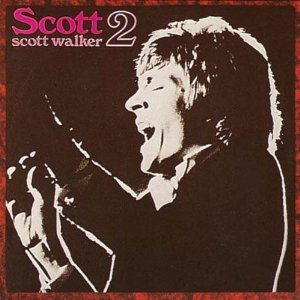 Scott 2
Scott 2
(1968; Philips)
Looking back all the way to Scott Walker’s debut, it’s really not all that hard to see how he got to the dissonant, nightmarish art rock that has become his current M.O. In tracks like his take on Jacques Brel’s “My Death,” and his own masterful composition “Such a Small Love,” there’s a level of darkness and dread that simply never went away, and frankly only grew larger. With Scott 2, however, Walker began to explore darker and more cynical lyrical themes, many of them once again pulled from Brel’s catalog. Take “Next,” for example, a track that sounds upbeat and jovial, but contains lyrics dealing with sex, abuse, homosexuality and prostitution. And “The Girls and the Dogs,” also Brel’s, is cynically humorous, juxtaposing human relationships with those between man and man’s best friend, with more than a few cruel twists. It’s not so hard to see why Walker drew so heavily from Brel’s catalog — both artists embraced a contrast between dark humor and just plain darkness in much of their work. Yet when Walker was coming into his own as a solo artist, psychedelic rock music was the major trend, and one he had no interest in taking part (though more than a few of his songs, with vocals removed, would fit in alongside the trippy instrumental soul of David Axelrod). So, instead, we have orchestral pop and easy listening ballads with songs of prostitutes and weirdly uncomfortable portrayals of humanity. One of the best of these, “Plastic Palace People,” also serves as an excellent precursor to Walker’s later, more difficult material. But that part of Walker was always there; he just set his target for more conventionally pretty sounds back in the ‘60s.
Rating: 8.9 out of 10
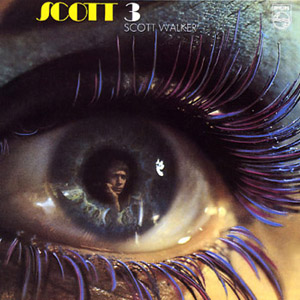 Scott 3
Scott 3
(1969; Philips)
During the Scott era, Scott Walker was at the height of his powers—at least the height of his first act, anyhow. All four albums in the series more or less maintained a pretty unimpeachable standard of quality, and you’ll probably notice that most of them have pretty close scores as far as Treble is concerned. Scott 3 isn’t any different in that regard; it contains some of Walker’s best songs—“It’s Raining Today,” “Big Louise” and all 89 wonderful seconds of stripped-down sing-along “30 Century Man.” It’s also the first Walker album to feature more originals than covers, with three Brel versions stacked up at the end. Where Scott 3 diverges from its three counterparts, however, is in the fact that it seems the subtlest and slightest of Walker’s ‘60s output. Four songs end before reaching the two-minute mark, and quite a few other tunes seem adrift in fluffy orchestral arrangements, without having quite the impact that the highlights on Walker’s two prior albums had. That being said, these are minor complaints of an otherwise outstanding full-length, with which Walker outdoes himself on the 10 originals he presents here. “Big Louise” is often rightfully recognized as an all-time great, with its poetic portrayal of a woman, possibly a prostitute, with tragic loneliness and a crumbling facade: “She’s a haunted house/ And her windows are broken/ And the sad young man’s gone away.” And “30 Century Man” is a playfully satirical play on the idea of legacy, in which Walker suggests to “Play it cool/ And Saran wrap all you can.” Don’t know how this will sound in 1,000 years, but after 44, it’s still a thing of effortless perfection.
Rating: 8.8 out of 10
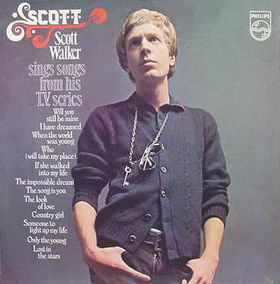 Scott: Scott Walker Sings Songs From His TV Series
Scott: Scott Walker Sings Songs From His TV Series
(1969; Philips)
For a time in the 1960s, Scott Walker had his own BBC TV series on which he would perform ballads and standards, and studio recordings of the songs he performed were shortly thereafter collected on a full-length album, Scott Walker Sings Songs From His TV Series. In dramatic contrast to the avant garde crooner he was turning into, however, the songs here are mostly schlocky, sometimes tepid easy listening standards that under ordinary circumstances would never make it out of Branson, Missouri. Walker has disowned this material, along with several of his ‘70s albums, and you can’t really blame the guy. Based on what he was capable of writing and performing, TV Series is pretty unremarkable. But it was just a short diversion; a few months later he’d release one of the greatest albums of his career.
Rating: 5.0 out of 10
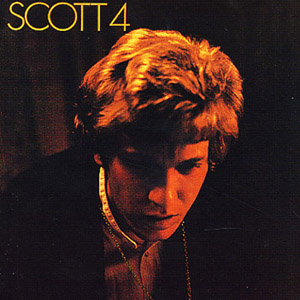 Scott 4
Scott 4
(1969; Philips)
Scott Walker closed out the 1960s with one of the strongest records of his career. The first of his records to feature all original material, Scott 4 finds Walker hitting a new stride that, unfortunately, would get derailed fairly shortly thereafter, but a stride nonetheless. Needless to say, it was also his most ambitious album at the time, pushing his songs’ arrangements to even more dramatic and evocative places and incorporating stronger influences from Ennio Morricone (“The Seventh Seal”) and—surprise, surprise!—psychedelic rock (“The Old Man’s Back Again,” “Get Behind Me”). Essentially all of the good ideas that simmered on Walker’s previous albums come to a boiling point here, bubbling over with a tension and immediacy that had never been quite as prevalent. And yet, some of its best moments, like the ornate “Angels of Ashes,” are imbued with an understated grace, juxtaposed against the hard-hitting grooves and Stalin-inspired narrative of “The Old Man’s Back Again (Dedicated to the Neo-Stalinist Regime)”. Without the incorporation of Brel compositions as an anchor, Walker allows himself to take on even bigger ideas and more ambitious directions. Curiously, the album even ends on a country song (“Rhymes of Goodbye”), which, as it turns out, is pretty much a knockout. This is Walker artistically spreading his wings and soaring majestically, the awe-inspiring result of which leaving a massive impression on the likes of David Bowie, Pulp, Tindersticks and pretty much most British music of note to be released in the ‘80s and ‘90s. Commercially, however, it was (at first, anyhow) less successful than its predecessors, which likely says something about the combination of a built-in audience with tastes that skewed too conservative, and an entirely separate audience of rock listeners for whom Walker seemed too much of an outsider. We know better now.
Rating: 10 out of 10
Any Day Now
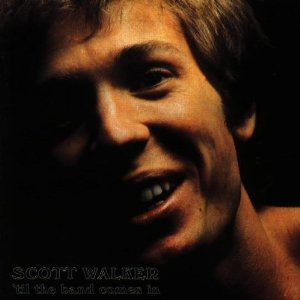 Till the Band Comes In
Till the Band Comes In
(1970; Philips)
The 1970s weren’t particularly kind to Scott Walker. After a dynamite 1960s, in which Walker made a name for himself as an avant garde crooner with a knack for wit and dark storytelling, he had begun to lose the qualities that made him such a formidable performer to begin with, at his lowest points going through the motions with uninspired covers. But Till the Band Comes In is still pretty far from that nadir. In fact, it’s quite good. While starting to show fissures in his otherwise solid foundation, Till the Band Comes In is the last really good album Walker released before briefly losing his way in the 1970s. A more-or-less concept album about the goings on in an apartment complex, the album focuses on odd characters and hard-luck tales, each one on the wrong side of the best years of their life. Yet there’s a vibrancy to the arrangements here that hides the tragic nature of his stories. “Joe” has a big, brassy jazz arrangement, and the title track hits harder than almost any of the Walker tunes of the ‘60s. But there is certainly some filler, some mushy middle, some bloat. It’s not perfect, but it’s an album that deserves more praise than it gets, particularly from Walker himself.
Rating: 7.5 out of 10
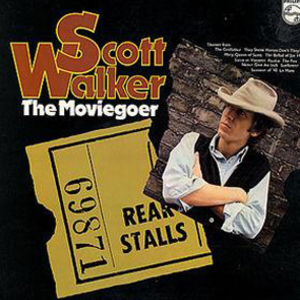 The Moviegoer
The Moviegoer
(1972; Philips)
The deeper Scott Walker eased into the 1970s, the more of a creative rut he found himself in. His voice still could soothe every regenerating head of the hydra, of course, and there’s no question that the man had good taste. But with The Moviegoer, he had followed the questionable instinct of recording an album’s worth of ballads from popular films. This in itself isn’t really a horrible thing, but it also — at this point in Walker’s career — meant a pretty serious dearth of inspiration. It’s essentially an inoffensive, pleasant, easy listening pop album with a few highlights and not much in the way of memorable material. As fun as it is to hear Walker croon “Speak Softly Love,” the highly recognizable love theme from The Godfather, he plays every track pretty straight. They sound good, and professionally performed, but the challenge and art of the material on his first four albums has essentially vanished. I don’t know if I’m cynical enough to say this was a “cash-in,” but it’s not far off.
Rating: 5.5 out of 10
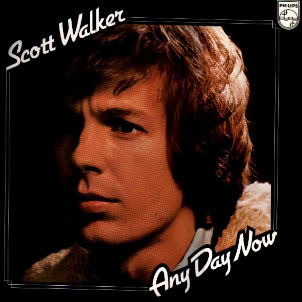 Any Day Now
Any Day Now
(1973; Philips)
Wow, things really went downhill after Till the Band Comes In. For as much as Walker himself has a problem with that album, and as bloated it is compared to the stunning Scott series, it at least had its share of really good songs. And Walker originals, at that. Any Day Now, like The Moviegoer and the two albums that follow it, is all covers, and uninspired ones at that. Where before Walker’s career was something of a study in Brel, here he’s just doing Randy Newman and Bill Withers karaoke. Even more problematic is his cover of Caetano Veloso’s “Maria Bethania” with an odd fake Brazilian accent. This is what creative wilderness sounds like. Certainly, the ‘70s did a number on a lot of artists, but for Walker it damn near derailed his career.
Rating: 4.0 out of 10
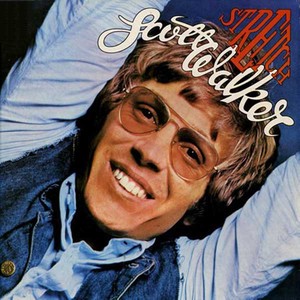 Stretch
Stretch
(1973; Columbia)
Released the same years as Any Day Now, Stretch is basically just a continuation of that album’s tepid easy-listening covers. In fact, it, too, contains songs written by Randy Newman and Bill Withers, so it’s almost as if Walker set a template for himself that he didn’t intend to step out of. But, oddly, Stretch is — and this is relatively speaking, of course — a better album. It might be that Walker seems more engaged with the material, particularly on Withers’ “Use Me,” which is a more successful adaptation than “Ain’t No Sunshine” from his previous effort. But it’s still a weak effort, even if it’s not the weakest.
Rating: 4.7 out of 10
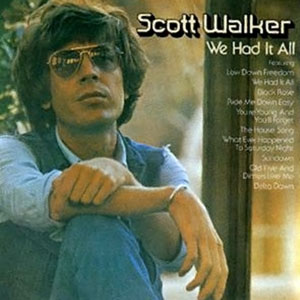 We Had It All
We Had It All
(1974; Columbia)
Walker goes country! On Stretch, Scott Walker had already begun to show some interest in country & western music, and if you really want to split hairs, he even revealed some traces of country influence on his first true masterpiece, Scott 4. But We Had It All takes it much, much further. In fact, it’s basically a Glen Campbell album. Critics didn’t respond well to this transition, though at this point, he hadn’t gotten much critic support in a good half-decade or so. And, once again, We Had It All is yet another weak effort, particularly in light of all the excellent material that Walker released in the ’60s. But it’s a good step up from the previous two, at least, showing that country, while not a step forward for Walker, at least produced some halfway decent material. In particular, the title track and closing Alex Harvey cover “Delta Dawn” are salvageable. For the next 10 years, however, Walker wouldn’t release any more solo material, which on paper might seem like he had hit a drought of sorts. That, of course, isn’t true. He was working toward something…
Rating: 5.2 out of 10
The Escape
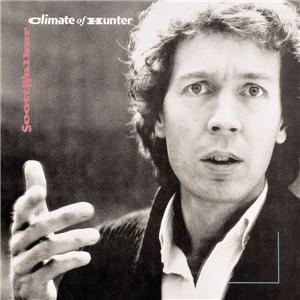 Climate of Hunter
Climate of Hunter
(1984; Virgin)
Ten years separate Scott Walker’s tenth and eleventh albums, though it’s not because he was taking a hiatus. In fact, much of that time was occupied by the recording and release of three Walker Brothers albums, the last of which, Nite Flights, proved to be a crucial turning point for Walker artistically. On that album, and “The Electrician” in particular, Walker pushed even farther into dark art rock sounds, and he hasn’t turned back since. Climate of Hunter, his first truly essential album in 13 years upon its release (not counting Nite Flights, of course), is the first permutation of the abstract visionary Walker we know today. Released in 1984, the album bears a lot of the hallmarks of a big ‘80s production: synthesizers, fretless bass, lots of guitar solos. However, the names of the guests on the album might turn some heads as well, including free-improv jazz saxophonist Evan Parker, Dire Straits guitarist Mark Knopfler and “Carribean Queen” hitmaker Billy Ocean. Knopfler is the most visible here, however, as a sideman akin to Stevie Ray Vaughan on David Bowie’s Let’s Dance. Frankly, Climate of Hunter sounds a lot like the demented flipside of Let’s Dance. It’s still a big, expensive ‘80s production by a star of the ‘60s and ‘70s, but with much darker twists and turns. Though for even closer musical comparisons, it keeps good company with the likes of Talk Talk and Kate Bush, and of course, everything Scott Walker would release thereafter. Curiously enough, the album did launch a single, the relatively accessible (but still pretty weird) “Track Three.” (Did I mention half the songs don’t have titles?) But “Track Six” is where the twisted, terrifying Walker begins to show his face. We’ve been expecting you.
Rating: 8.7 out of 10
 Tilt
Tilt
(1995; Fontana)
There’s no turning back now. After another decade-long break, Walker’s re-emergence in the ‘90s found him wielding the most dangerous, noisy and outright troubling songs of his career. This is a man, after all, whose entire career was pocked with dissonance, death, darkness and sexual taboos, and in one fell swoop he outdid the whole lot. Tilt is a masterwork in musical violence. On some level, it still maintains the orchestral pop sound that Walker has pursued throughout his career, but twisted in knots, turned upside down, scraped with sandpaper and bent into monstrous shapes. At its most accessible, it can be both mildly unsettling (“Bolivia ’95,” “Farmer in the City”) and outright horrific (“The Cockfighter”). “The Cockfighter,” in particular, is a breakout track, switching from spoken-word dark ambient to pummeling industrial thunder at the flick of a switch. The way Walker moans “It’s a beautiful night!” suggests that it’s anything but, with glimpses of the Holocaust poking through the metal-machine music. The entirety of the album is not this hostile, but it certainly doesn’t get much friendlier. Tilt likely shocked a few listeners who only knew Walker’s 1960s output, but it also opened him up to new, exciting possibilities and some of the best material of his career.
Rating: 9.2 out of 10
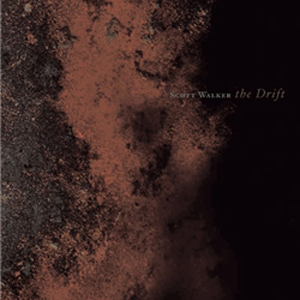 The Drift
The Drift
(2006; 4AD)
Another 11 years pass between albums, and Walker, in spite of some soundtrack material, maintains a low profile between the ‘90s and the ‘00s. And because Walker essentially stopped performing live in the ’70s, it’s not as if he had been touring between records either. So for Scott Walker to return once again in 2006 with something so mesmerizing and massive in The Drift would be nothing short of revelatory. With a 68-minute running time, The Drift is an exhausting album, even an overwhelming one. But that it’s so draining is an essential part of its appeal. It is, simply, Walker’s most powerful piece of work, though it’s also one of his most difficult. To begin with, few records in history have ever reached a level of terror this visceral and real. Walker has an uncanny knack for finding the right combination of sounds that are able to make the hairs on one’s neck stand up straight. This is goosebumps amplified to eleven; The Drift, in essence, is The Shining: The Rock Album. Its bookends, the abrasive stomp “Cossacks Are” and closing ballad “A Lover Loves,” are the most accessible moments here, sandwiching between them material that’s as challenging and harsh as it is stunning. The 12-minute “Clara” juxtaposes imagery of September 11th against sounds of a side of beef being pummeled. A fucked-up “Jailhouse Rock” riff underscores “Jesse,” the horrific dirge about Elvis Presley’s stillborn twin brother (a morbid muse that also appears in Nick Cave’s “Tupelo”). It would be the least inviting album in the world if Walker hadn’t pulled it off with such masterful arrangements, and such powerfully moving songwriting. That’s not easy to do. Nothing that Walker does is, but here, it’s an entirely new level of awe.
Rating: 9.6 out of 10
 Bish Bosch
Bish Bosch
(2012; 4AD)
The most recently released of Walker’s 14 albums, sparsely distributed across 45 years, Bish Bosch is also—and bear with me now—possibly his most absurd. The title is silly. There is a 20-minute track full of dwarf puns and personal insults. Oh, right, and fart noises. For an artist whose career has seen him delve into taboo topics in even some of his most beautiful songs, Bish Bosch still delivers plenty of shocks and surprises. Not many 70-year-old artists can boast as such, but Walker is unique. However, to simply toss Bish Bosch aside as the point at which the man finally goes off the deep end would be a mistake. If anything, it circles back toward accessibility, if only slightly. It’s certainly not as awe inspiring as The Drift, but at times, it’s more approachable. The slide guitar and tubax arrangement of “Epizootics!” is one of the catchiest things he’s released in decades, “catchy” being a relative term here. Yet it’s a stunning track all the same. Even prettier is “The Day the ‘Conducator’ Died,” itself a spacious dirge with sparsely strummed chords and a more graceful darkness than usual. Though I wouldn’t call this aging gracefully, necessarily. Like I said, there are fart noises on this album. But Walker, after a handful of albums of sprawling, nightmarish art rock, is clearly having some fun. Not that Bish Bosch isn’t still nightmarish — it’s just more It than The Shining.
Rating: 8.8 out of 10

Soused (with Sunn O))))
(2014; 4AD)
Scott Walker’s been in the company of a number of curious and interesting collaborators over the years, perhaps the only artist to have shared studio time with both Mark Knopfler and drone-doom duo Sunn O))). The final studio album he released in his lifetime was Soused, this collab with Stephen O’Malley and Greg Anderson that seemed such a natural and perfect meeting of minds that it might have very well willed itself into existence. The ambient heaviness and ominous gloom of Sunn O)))’s low-end roar melds brilliantly with Walker’s eerie vocal performances, though it’s Sunn O))) in particular who step outside their typical M.O. most often here, delivering melodic riffs, occasional crashes of percussion and a general reach toward more ambitious sounds. It comes together strongest on a track like “Brando,” in which Walker and Sunn O))) achieve something that neither one has often been much concerned with: An anthem.
Rating: 9.2 out of 10
Jeff Terich is the founder and editor of Treble. He's been writing about music for 20 years and has been published at American Songwriter, Bandcamp Daily, Reverb, Spin, Stereogum, uDiscoverMusic, VinylMePlease and some others that he's forgetting right now. He's still not tired of it.

